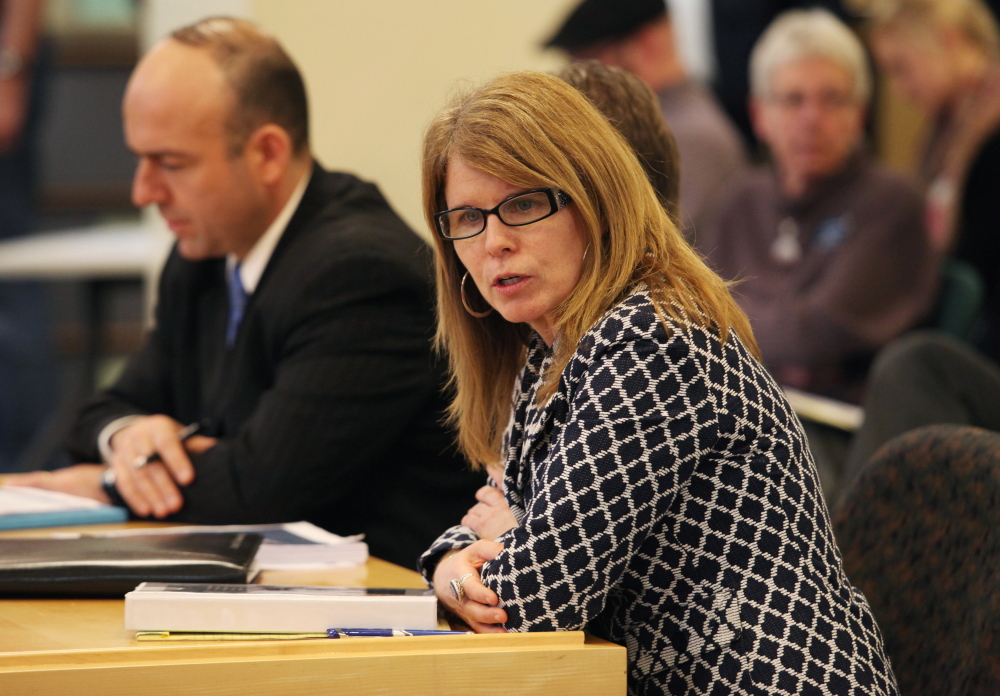AUGUSTA — The LePage administration continued its intense public relations campaign against Medicaid expansion with a lengthy news conference Wednesday detailing the public health insurance program’s impact on state agencies.
The event, held in Gov. Paul LePage’s Cabinet room but not attended by the governor, came as lawmakers continued to debate a proposal to add more than 60,000 people to the publicly funded health insurance program for the poor, and as lawmakers on the Health and Human Services Committee began reviewing a bill sponsored by Assistant Senate Minority Leader Roger Katz of Augusta aimed at making expansion possible.
Katz’s proposal is designed to garner Republican support for expansion, already a top priority for Democrats, who have the majority in the Legislature but not enough votes to override a veto by LePage.
On Wednesday, the LePage administration attempted to ensure that most Republican lawmakers stay opposed to expansion. Commissioners and officials from several state agencies assembled in the Cabinet room to detail the impacts that current Medicaid spending has had on their respective budgets. The administration has said that the program is “cannibalizing” funds for natural resource protection and other state programs.
Walter Whitcomb, commissioner of the Department of Agriculture and Conservation, said the state’s natural resource agencies had lost $13 million in state funding in just five years because of the state’s inability to control Medicaid spending.
“But the natural resource agencies have taken it on the chin, financially,” Whitcomb said.
Department of Marine Resources chief Patrick Keliher said budget cuts could stunt his department’s ability to study threats to juvenile lobsters and preserve the state’s most lucrative fishery.
The event was part of a coordinated campaign by the administration to use the strapped budgets of state agencies as a reason to oppose expansion.
The strategy was foreshadowed in emails obtained by the Portland Press Herald.
The emails showed discussions among high-level officials at the Department of Health and Human Services about the approach, and how to downplay attention to a controversial taxpayer-funded report that the administration had hoped would bolster its anti-expansion position.
In one email, the communications director at DHHS wrote that public relations staff in each state agency had been asked by LePage officials to write newspaper opinion columns about how Medicaid spending affects their respective budgets.
Since then the administration’s strategy has played out publicly in a number of press statements from state agency officials about the effects of Medicaid.
During the news conference in LePage’s Cabinet room, DHHS Commissioner Mary Mayhew said it was important to consider the “broad array of competing priorities” that will be affected by increased Medicaid spending.
Jessamine Logan, a spokeswoman for the DEP, said budget gaps driven by Medicaid spending had forced lawmakers to raid two funds designated for cleanup of oil spills.
The depletion of the cleanup funds came into public focus last summer after the train disaster in Lac-Megantic, Quebec, when it was reported that it had been depleted by 60 percent since 2005 because of a sharp decrease in tariffs collected from companies shipping crude oil and legislators’ decisions to raid the funds.
According to the Legislature’s non-partisan budget office, lawmakers have moved $1.5 million from the two oil cleanup funds into the General Fund over the last three years.
In addition, the previous Legislature took $250,000 from the Groundwater Oil Clean-up Fund in 2012 to help pay for L.D. 1853, a bill that authorized the DEP to develop new metal mining rules, an initiative the LePage administration supported.
The intensifying debate underscores the divide over Medicaid expansion, which if enacted, could bring health-care coverage to more than 60,000 low-income Mainers.
The plan advanced by Katz would establish a managed care system for all 320,000 beneficiaries of the $2.5 billion program in an effort to control costs.
The Health and Human Services Committee reviewed that bill Wednesday afternoon, but delayed a vote.
The panel could vote on the measure Thursday.
Mayhew described the Katz plan as a “fancy” initiative that would only expand Medicaid and not achieve its stated savings.
She said national studies showed that managed care works only in states with high Medicaid reimbursement rates.
National data shows that managed care in Medicaid is becoming more common as states try to control spending on a program that accounted for 23.6 percent of total state expenditures in fiscal year 2011, according to the National Association of State Budget Officers.
The Kaiser Family Foundation reported that the rate of Medicaid recipients enrolled in some form of managed care increased from 57 percent in 2002 to 66 percent in 2012. Managed care is used in at least 45 states, according to the U.S. Department of Health and Human Services.
The Kaiser Foundation also found that managed care produced mixed results, and that significant savings were largely dependent on how states crafted their plans.
The key savings drivers, the report said, were reduced emergency room use and improved use of primary care physicians.
Democratic leaders slammed the administration’s news conference.
Senate President Justin Alfond, D-Portland, took issue with the administration’s characterization of Medicaid recipients as cannibals, saying the beneficiaries of the program were primarily low-income children and the elderly.
House Speaker Mark Eves, D-North Berwick, said the administration’s response reflected its “fear of the movement that’s happening with health-care expansion.”
Steve Mistler can be contacted at 791-6345 or at:
smistler@pressherald.com
Twitter: @stevemistler
Send questions/comments to the editors.


